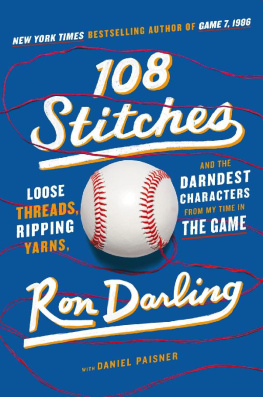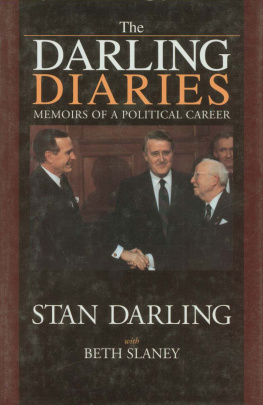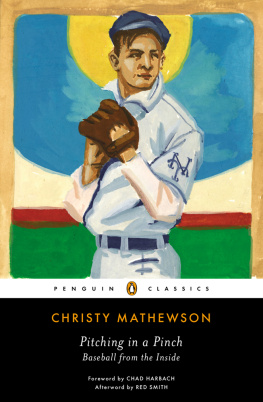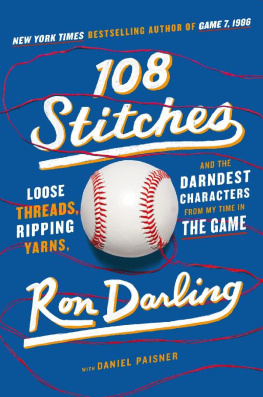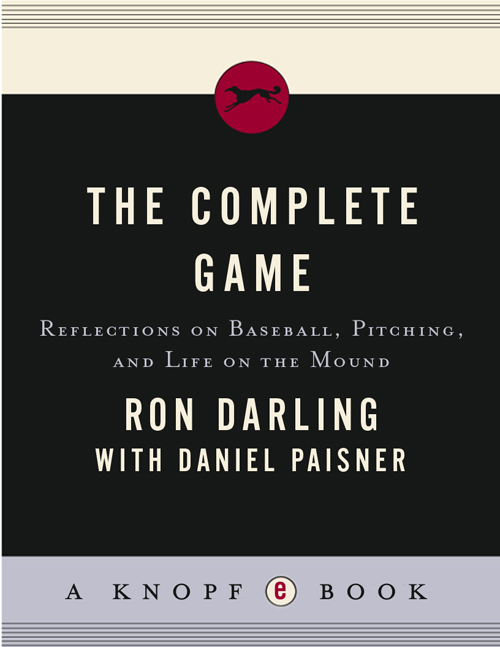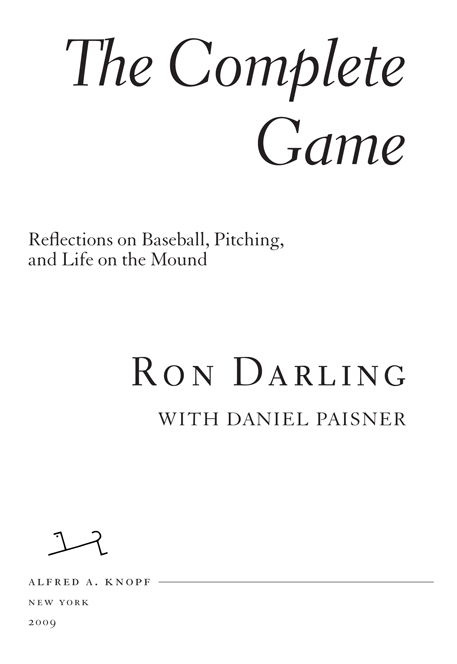It breaks your heart. It is designed to break your heart. The game begins in the spring, when everything else begins again, and it blossoms in the summer, filling the afternoons and evenings, and then as soon as the chill rains come, it stops and leaves you to face the fall alone.
A. BARTLETT GIAMATTI
former president, Yale University
former commissioner, Major League Baseball
from The Green Fields of the Mind,
Yale Alumni Magazine (November 1977)
Contents
FIFTH INNING
PREGAME

Let's Get It Right Today
Give me the damn ball!
That's been the rallying cry of major league pitchers since the turn of the last century. The ball. The pill. The rock. Call it what you want, it's the only equipment we needour badge of honor, our point of pride. It's basic, as weapons go: a rounded piece of cushioned cork layered with a fine coating of rubber cement and wrapped in a tight winding of gray and tan wools and a thin poly-cotton thread. Then, another fine coating of rubber cement and two strips of cowhide, bound together with eighty-eight inches of waxed red threadhand-sewn in the small farming village of Turrialba, Costa Rica, with 108 stitches.
But, of course, it's not only about the ball. It's about the act and the art of throwing it, and the responsibility that goes with the privilege of doing so for a major league baseball team. For most of us who have taken the pitcher's mound at the professional level, it's the weight of carrying the fortunes of our teammates, the sweet burden of being on point, that sets our role apart. If we don't execute, there's no hiding it out there on that mound.
Everyone who plays a sport likes to think he or she is pivotal, but with pitchers this is not an arrogant or self-aggrandizing view. The game rests on our shoulders. We stand apart from our teammates and set the tone. All eyes are on us. The game is in our hands. The hopes of our teammates are pinned to our chest. Sure, the outcome of any one game might turn on a remarkable effort in the field, a mighty swing of the bat, a gutsy play on the bases, but everything that happens on a ball fieldeverything!flows in some way through the pitcher. It has every damn thing to do with us. That's how we feel, and the reason we feel this way is because it's been drummed into us over countless starts, countless innings, countless pitches with the game on the line.
Tom Seaver, one of the greatest pitchers ever to take the mound, and certainly the greatest to do so in a New York Mets uniform, had a cutting way with words. If he liked you, he was one of the most generous souls in the game. If he didn't well, not so much. We played together, briefly, in 1983, when I joined the big club for a late-season cameo. It was Tom's second tour with the Mets, and he was cast as a conquering hero, a favorite son turned elder statesman. He had a not-so-flattering nickname for the Mets trainer, Fifty-Fifty; I couldn't figure why. After I'd been in the bigs for a couple weeks, I got up the courage to ask Tom how he came up with the name.
He's not the best trainer, kid, said Tom, who himself was known as the Franchise. (How's that for a nickname to confirm my point?) And he's not the worst. He doesn't help you, he doesn't hurt you. Fifty-Fifty.
I've thought about that moniker a lot over the years, and early on I hoped it would never apply to me as a ballplayer, affectionately or otherwise. Over time, however, I realized there was no avoiding the tag. Sometimes you justify the faith your teammates place in you, and sometimes you don't. If you come through more often than not, you're doing okay.
And yet, in success and in struggle, getting the ball on game day has to be the greatest rush in professional sports. The game acknowledges this, in its own way. There's a certain amount of ceremony to the anointing or assigning of pitching duties, like a transfer of power. It used to be that pitchers knew they were getting a start only when they arrived at their locker to find that day's pristine game ball sitting in their glove. The first time I heard about that, I was already in the bigs, and it struck me as a fitting tradition: you come to the ballpark; you find the ball in your locker; you understand it's on you. That particular baseball ritual is gone, but the symbolism holds. You can see it in the way an entire team stands back in deference to the particulars of its starting pitcher. You can see it in the stony silence position players offer their pitcher while he's throwing a gemor a dud. You can see it in the way a manager waits on the mound to place the ball in the hand of a reliever after a pitching change. He strips one pitcher of the honor and delivers it to the next, sending one man to the showers while his successor takes the hill. The sword is passed, and we're entrusted with the fate of our franchisefor that one day, or even that one batter, at least until we fall short.
A starting pitcher, on his day, is a man alone. You're totally ignored by your teammates. You feel it the moment you get to the ballpark, and it runs through the entire game. There are exceptions: some pitchers are nervous and like to kid around, to relax; some pitchers reach out to their teammates and engage them in conversation, about the game or something else. But most pitchers are off on their own, lost in thought, making ready. They're looking for that zone, that tunnel, that place of calm and quiet that lets them get their head around the game, while their teammates hang back warily, afraid to encroach.
It's a special, certain thrill to head out to the ballpark knowing the game is yours, to do with what you will. For my family, it was somewhat less thrilling. I'd get a little moody as game day approached. On the morning of a game, it's possible I even lapsed into surliness. I was something of a bear, I was told, and my game-day habits reflected this. I would not be crossed or told what to do. For night games, I took my lunch at noon, because I wanted to be good and hungry and in an even fouler mood when game time rolled around. Lunch was always the same: steak, mashed potatoes, and peas. (Note: try finding good peas in Cincinnati.) All day long, I drank plenty of watermore or less, depending on the weather. (Another note: there wasn't enough water on the planet to keep a pitcher hydrated on the St. Louis turf in the middle of August, when temperatures ran to 130 degrees.) There was also a touch of cold sweats and nausea.
Game days at Shea were a particular adventure. On the road, I could hide in the shadows of the team bus, but at home I was on my own. You'd never know what might set me off. Early on in my career, I was the guy you didn't want to talk to on the 7 train out to Flushingnot quite De Niro in Taxi Driver, but close. Later, when the fans started to recognize me and the subway was no longer an option, I was the guy you didn't want to piss off on the Grand Central Parkwaythe guy who could claim road rage as an essential occupational tool.


